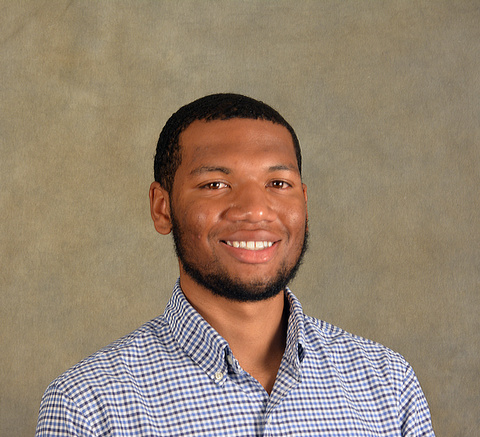
Chad Rhym is using his experience in two professions, journalism and sociology, to conduct research that can improve both.
Chad Rhym’s photography and writing were gaining recognition while he was still in high school. He interned at The New York Times as a student at Morehouse College and graduated in 2019.
Chad also took advantage of a 2018 Summer Research Opportunity Scholarship to work as a research assistant for Professor Sarah Bruch at the University of Iowa Public Policy Center.
His time at Iowa’s Public Policy Center left an impression. Chad says, “I have always been grateful for that experience, to see the potential and impact of working amongst an interdisciplinary and brilliant group of scholars in one building and its ability to foster innovation and support.”
Chad enrolled as a graduate student in the University of Iowa’s Sociology PhD program and started developing a research project that examines journalism using the analytical tools of sociology. Now he is happy to be back in the Public Policy Center, which gives him the resources to finish his degree through its Dissertation Completion Program.
Piqued by his time at The New York Times, Chad’s scholarship investigates journalistic notions of objectivity. Objective reporters try to stick to the facts without injecting personal opinions. He looks at objectivity from a sociological perspective, bringing in what sociologists term a racial project—a set of ideas that might appear neutral but nonetheless convey group-based interests.
Chad’s work comes at an important time for journalism, what he calls, “a particularly unique and pivotal period.” Following the 2016 presidential election and the 2020 George Floyd protests, journalism has been forced to deal with race and racism in complicated ways. Chad’s work examines how this recent history shapes journalistic notions of what counts as good professional practice. Several questions guide Chad’s research: How do Black and
White journalists define objectivity? Do notions of what counts as objective differ based on the race of the journalist? How do the assumptions that Black and White journalists bring to reporting shape a story?
Chad brings his personal experience as a former Black journalist to this endeavor and is also indebted to the contributions of scholars such as Ida B. Wells-Barnett, W.E.B. Du Bois, and the many Black journalists and Black newspapers that challenged mainstream journalistic norms and portrayals of Black communities. Building on these classics for his dissertation research, Chad plans to interview three generations of Black and White journalists at different career stages to understand how they have learned, taught, engaged, defended, and or critiqued the “gold standard” of objective journalism in their current professional stage.
Chad says that the Public Policy Center gives him excellent support to carry out this work. Having an office at the Center helped him build consistent research and writing routines and provided the space to think independently about his work. Chad also notes the importance of being surrounded by a community of scholars who, every single day, have been encouraging, engaging, and supportive in “genuinely challenging, improving, and refining my scholarship.” He credits Mark Berg and Ethan Rodgers for planning an effective program that provides networking opportunities—Professor Mark Berg is a sociology professor who also now directs the Public Policy Center; Adjunct Professor Ethan Rogers earned his PhD in our department in 2019 and is the Center’s operations manager.
Chad says that Mark and Ethan have forged a community that is, “unfathomably helpful in generating new ideas and perspectives.” The scholars in the Center check in with each other regularly to formalize a feedback process that propels research forward.
Chad’s collaborative spirit extends beyond the policy center, as he’s been involved in several other research project in his time at Iowa. He has researched how race shapes the experiences of high school teachers and assisted Professor Louise Seamster in our department with her research on the Flint Water Crisis.
Ultimately, Chad hopes his research will provide policymakers with better insight into potential solutions for the problems faced by American journalism in the 21st century. Critical issues include the need for concerted efforts to save local and community journalism, as well as the need to think critically about race and traditional norms and virtues within the newsroom and their impact on trust in the media.